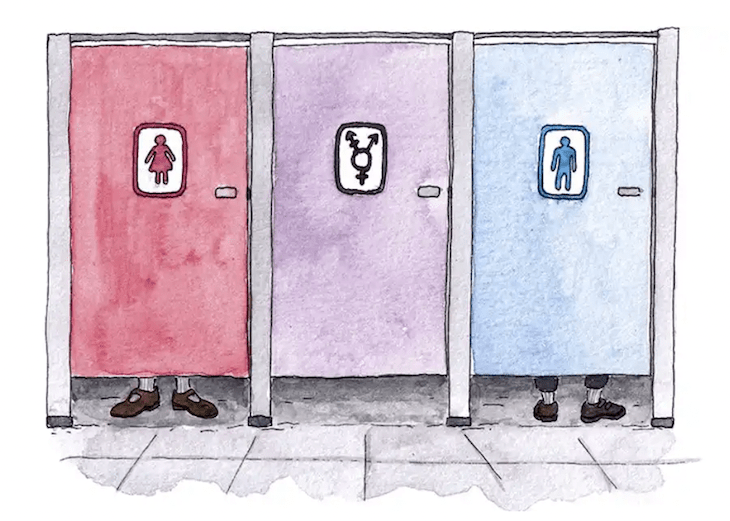Concern with what schools are teaching about sex, gender and relationships has been growing. Parents worry their children are being exposed to inappropriate sexualised content and that they are being taught to question their gender identity. Some even report discovering their children are using new names and pronouns while at school without their knowledge or consent. Yet these fears are frequently dismissed as reactionary parents trading in anecdotes and panic. Nothing to see here, has been the message from schools and campaigning organisations alike. Until now.
A report from Policy Exchange reveals the extent to which gender ideology is being promoted in schools and the shocking ways in which this puts children at risk. In Asleep at the Wheel: An Examination of Gender and Safeguarding in Schools, Lottie Moore uses hard data to expose the true proportion of schools that are leading children down the transgender path.
More than a quarter of schools allow male pupils to use the same toilets as girls
This research shows that an astonishing four in ten secondary schools now operate a policy of gender self-identification. This means that teachers ignore all records of a child’s biological sex and instead treat pupils as whatever gender they declare themselves to be. The safeguarding risks of this approach should be immediately obvious. Policy Exchange has the statistics: at least 28 per cent of secondary schools are not maintaining single sex toilets, and 19 per cent are not maintaining single-sex changing rooms.
In other words, at a time when concern about sexual harassment among teenagers is rife, more than a quarter of schools allow male pupils to use the same toilets as girls. And almost one third of schools now teach pupils that a person who self-identifies as a man or a woman should be treated as a man or woman in all circumstances, even if this does not match their biological sex. Presumably such moral lessons hold true when that person seeks to undress next to you in a changing room. Shockingly, girls are being instructed not to have boundaries or to expect privacy when it comes to their own bodies.
Sadly, it is all too easy to see how this situation has arisen. When faced with seemingly competing demands to safeguard pupils and to adhere to a contested gender ideology, headteachers and school governing bodies have taken the politically easier option and decided to appease transgender activists. But this may leave schools in breach of the law.
Take another shocking statistic the research has uncovered: only 28 per cent of secondary schools are reliably informing parents as soon as a child discloses feelings of gender distress. They allow pupils to adopt a new gender while at school and conspire to keep this from their parents. It is difficult to square this practice with Article 8 of the Human Rights Act which sets out the ‘right to respect for private and family life’.
Schools argue they are having to deal with a growing number of children presenting with gender distress and have, not unreasonably, sought help from external agencies on how best to handle this new problem. But this overlooks the role schools have played in promoting gender distress in the first place. Asleep at the Wheel reveals that 25 per cent of schools are teaching children that some people ‘may be born in the wrong body’ and almost three quarters of schools teach that people have a gender identity that may be different from their biological sex.
This makes it abundantly clear that it is not one or two activist teachers promoting regressive stereotypes over biological facts but that such ‘lessons’ are being repeated in the overwhelming majority of schools. This is in contravention of Sections 406 and 407 of the Education Act 1996 which dictates that schools have a legal obligation to be politically impartial and that where political viewpoints are raised, children should be offered a balanced presentation of opposing views.
In attempting to address a problem at least partially of their own making, schools end up exacerbating confusion about gender still further. More than two-thirds of secondary schools insist that all pupils affirm a gender-distressed child’s new identity, presumably by using their preferred name and pronouns. In this way, children are compelled to speak untruths, and schools yet again fall foul of the Human Rights Act 1998, which protects the right to freedom of expression.
The Policy Exchange research on gender and safeguarding is to be welcomed. Never again will activist teachers or political campaigners be able to deny the reality of what is happening within our schools. In an important foreword to the report, Labour’s Rosie Duffield is clear:
‘This government has failed children by allowing partisan beliefs to become entrenched within the education system. Meanwhile, the Opposition has failed to pull them up on it.’
This cannot be allowed to continue.







Comments